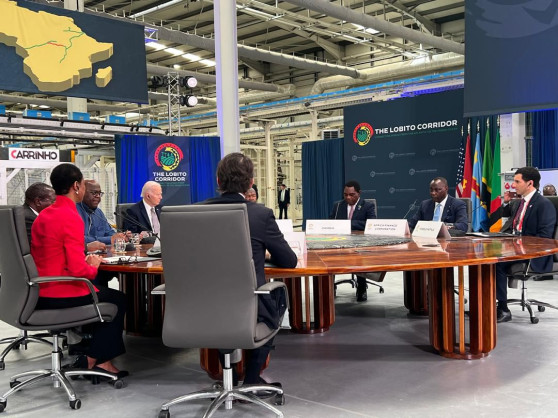Africa Finance Corporation (AFC)-led Zambia Lobito Rail Project receives boost from Biden visit to Angola

- Lobito rail project will break ground by early 2026, AFC CEO Zubairu says at Presidential forum
- AFC commits up to US$500m in financing for Zambia-Lobito greenfield rail
- AFC announces MOU with Kobold Metals as anchor client, guaranteeing at least 300,000 tons of copper and related freight per year
- AFC pledges US$100 million to Kobaloni Energy for Zambia’s first battery-grade copper sulphate facility
The Zambia-Lobito Rail project received pivotal support from US President Joe Biden’s just concluded visit to Angola, with the Africa Finance Corporation (AFC) (www.AfricaFC.org) as the lead developer announcing a series of commitments that underscore the project’s urgency and transformative potential to deliver economic benefits that transcend borders.
In a speech at the Lobito Corridor Leaders Summit, co-hosted by President Biden and President Joao Lourenço of Angola, and attended by Presidents of the Democratic Republic of the Congo (DRC) and Zambia, Vice President of Tanzania and representation from the private sector, AFC’s President and CEO Samaila Zubairu announced that the Zambia-Lobito greenfield rail project will break ground by early 2026. AFC is committed to mobilising $500 million in financing through various financial instruments, Mr. Zubairu said, bringing overall project financing to over $1 billion.
Among a series of additional announcements, Mr. Zubairu said AFC has established a Memorandum of Understanding with critical minerals enterprise KoBold Metals as an anchor client, securing a minimum of 300,000 tons of copper and related freight annually. AFC has also committed $100 million to Kobaloni Energy to support Zambia’s first battery-grade copper sulphate facility, ensuring sustained movement of cargo on the new railway.
“This project symbolizes what Africa’s leadership, together with our global partners, can achieve when we unite behind a shared vision,” Mr. Zubairu said in his speech at the forum. “It is not just about railways or minerals or food security — it is about fostering partnerships, creating jobs, and driving a sustainable future for Africa and the world.”
The Lobito Corridor will connect the Port of Lobito on Angola’s Atlantic coast with Zambia through modernized rail infrastructure. Plans are underway to extend connectivity to Tanzania’s Port of Dar es Salaam, linking the Atlantic and Indian Oceans, and strengthening regional trade and integration across East and Southern Africa.
AFC intends to collaborate with other multilateral development banks and financial institutions to develop instruments that attract global institutional capital. Additionally, AFC will engage African pension funds to invest, promoting generational sustainability.
The summit showcased significant progress in the development of the Lobito Trans-Africa Corridor. The project is led by the Lobito Corridor consortium, with AFC as the as lead developer, working in partnership with the US Government, the European Union, the African Development Bank and the governments of Angola, the Democratic Republic of Congo and Zambia.
“The rapid pace at which we are moving reflects the urgency of the type of development Africans are demanding from their leaders, and the conviction of this consortium to execute,” Mr. Zubairu told the summit. “The Lobito Corridor is more than just a rail line—it is an economic corridor that provides a lower-cost, lower-carbon gateway to African integration and global competitiveness.”
At the 79th UN General Assembly (UNGA) in September, AFC achieved a major milestone by signing concession agreements with the Governments of Angola and Zambia to extend the Lobito railway through Zambia’s Copperbelt. This entails the construction of an 830km greenfield rail line connecting the Benguela rail line in Lucano, Angola, to the existing Zambian rail line in Chingola. Simultaneously, AFC received grant funding from the US Trade and Development Agency (USTDA) towards completion of the environmental and social impact assessment for the project. These achievements, realised within one year of the 7-party MoU signed at the Global Gateway Forum in Brussels in 2023, highlight AFC’s catalytic role in driving the project’s rapid progress.
Once completed, the Lobito Corridor will offer the fastest and most efficient route for exports and imports, linking key mining regions, agricultural clusters and businesses in Zambia and DRC to the Port of Lobito, Mr. Zubairu said. The rail link will cut travel time from the Copperbelt to international markets from 45 days to just seven, significantly lowering costs. Shifting freight from road to rail will reduce emissions by at least 300,000 tons of CO2 annually, underscoring Africa’s leadership in the global energy transition and efforts to decarbonize the battery minerals value chain—particularly in producing battery precursors for both American industries and global markets, Mr. Zubairu told the summit it will also catalyse opportunities in ecotourism, agribusiness, and power transmission lines.
Beyond the greenfield railway, AFC is the Financial Advisor for the Lobito Atlantic Railway (LAR) consortium, concessionaires of the existing Benguela railway stretching across Angola and into the Democratic Republic of Congo.
Click here (https://apo-opa.co/49l5UUO) for a replay of the Lobito Corridor Leaders Summit.
Distributed by APO Group on behalf of Africa Finance Corporation (AFC).
Media Enquiries:
Yewande Thorpe
Communications
Africa Finance Corporation
Mobile: +234 1 279 9654
Email: yewande.thorpe@africafc.org
About AFC:
AFC was established in 2007 to be the catalyst for pragmatic infrastructure and industrial investments across Africa. AFC’s approach combines specialist industry expertise with a focus on financial and technical advisory, project structuring, project development, and risk capital to address Africa’s infrastructure development needs and drive sustainable economic growth.
Seventeen years on, AFC has developed a track record as the partner of choice in Africa for investing and delivering on instrumental, high-quality infrastructure assets that provide essential services in the core infrastructure sectors of power, natural resources, heavy industry, transport, and telecommunications. AFC has 43 member countries and has invested US$13 billion across Africa since inception.



